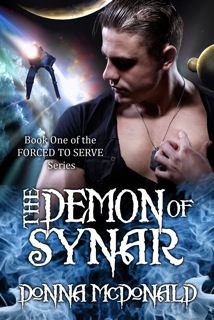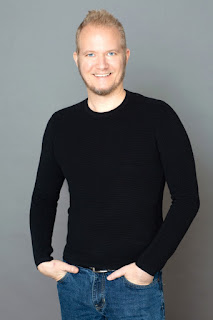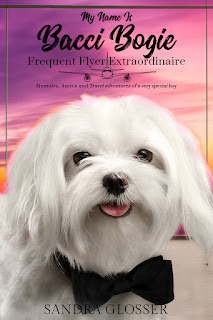10 Questions with SciFi Romance Novelist Donna McDonald (@scifiwoman13)
This Author Spotlight features Sci-Fi (and Fantasy) Romance novelist Donna McDonald.
After 35 years of doing everything for a living except writing books, Donna McDonald finally published her first romance novel in March of 2011. Ten novels later, she is now living her own "happily ever after" life as a modestly successful author who gives back to the universe by doing her best to keep several Lexington, Kentucky coffee shops in business.
McDonald dreams of selling her house and taking to the open road once she figures out how to do so without her children and grandchildren finding out.
For the time being, she continues to live contentedly with her permanent fiancée of many years who helps her sneak away from real life as often as he can. She loves him dearly for it.
1. How did you get into writing?
I have always been a writer of one sort or another. In high school, I wrote poetry and plays. In college, I was a Creative Writing minor. I also worked as a Technical Writer for over 18 years. During the 90s, I wrote lots of partial romance novels, entered and placed in contests, and dreamed about one day getting published.
But if you are asking how I finally found my way to self-publishing 14 novels, in 2009 I got laid off and spent a traumatic year after that caring for a family member with cancer. When that was done, I was too exhausted mentally and spiritually to give any energy to a serious job search. As I had for most of my life, I turned to reading and writing for solace. Then one Monday in summer of 2010, instead of scanning more job ads, I sat down and decided to write a book instead. Two-and-a-half obsessive weeks later, I typed “THE END” on a 70,000-word manuscript. Once I knew I could finish at least one full novel, it became clear I could finish as many as I wanted.
Unfortunately, my romances with older characters were too “niche” in my genre for traditional publishers. I collected lots of soft rejections, but all of them were about not thinking they could sell my work. In late December of 2010, I found JA Konrath’s indie publishing blog and was inspired by his data to see if I could sell the books myself. I felt sure there had to be a romance-loving audience among the “Baby Boomer” population. So in March of 2011, I put the first two books in the Never Too Late series up. I offered one as “free”. The second I sold for $2.99.
How has it worked out? Well, I started writing full time in January 2012 and supporting myself with my earnings. My earnings are modest, not like those that hit the news or bestseller lists, but readers are consistently buying my work, and I’m paying my bills working as a writer. My deal with my readers is to keep writing for as long as my readers are willing to keep buying, a true win-win career move for me.
To this day, Dating A Cougar is still free and still brings me many new contemporary romance readers. Recently, I also made The Demon of Synar, the first book in my science fiction romance/space opera series, free. It’s too early to tell, but that seems to be working, too.
2. What do you like best (or least) about writing?
What I like best are the reader tweets, posts, messages, and emails I receive that say I kept them up reading or made them laugh.
What I like least is revising, but I do it out of loyalty to those reading me. I believe readers deserve the best book I can produce. The proofreader I recently hired is a nitpicker extraordinaire. She is seeing all my new work (as of two books ago), but I’m also currently sending her through the backlist.
3. What is your writing process? IE do you outline? Do you stick to a daily word or page count, write 7 days a week, etc?
I’m mostly a “pantzer” because I love writing without a guideline and being surprised by where the characters take me on our journey through the story. However, after finishing 14 books, I find that I sometimes get about two-thirds through the book and have to create a chapter outline to keep plot elements straight. This has happened for 5 out of 14 manuscripts. Some just flow out of me. Others require a different approach.
I do try to write 5-6 days a week, but it varies from book to book. Sometimes I take several days off to “think” through a stopping point or block, and then I come back to write like a mad fiend again. I am blessed to live in a household that supports this kind of crazy schedule. My children are all adults. My fiancée is supportive AND tolerant of my creative muse. I feel blessed.
4. Who are some other writers you read and admire, regardless of whether they are commercially “successful?”
I read eclectically. I own and still buy the books of celebrated traditional authors in my field. I love Nora Roberts writing as JD Robb which I would call romantic suspense, but it takes place in the future. Today, I think that work might even be “urban fantasy” because so much of the world she has built is futuristic, even the crimes.
For romantic comedy, I read Janet Evanovich (Stephanie Plum series) and Jennifer Crusie (“Bet Me” and her older work). I also like Dan Brown just in general. “Eat, Pray, Love” by Elizabeth Gilbert remains my current favorite NYT list novel in the past five years. If you saw my library, you’d wonder about my tastes.
I admit my list of traditional authors is probably reduced to 4 or 5 these days. For the price of 1 traditional book, I can often buy 3 indie books. As I became an indie myself, I started tripping over really good authors on my journey. Now I find myself hunting the indie lists for a magic combination of great storytelling and unique premise. This is especially true in science fiction romance, fantasy, or paranormal. The rogue element (which may just be pure passion) in indie books is often an exciting, original voice. When I find one I like, I get addicted and have to buy all their work. So in this, I understand and can better appreciate readers who say that to me about my books.
My “indie urges” have led me in science fiction and fantasy romances to read Melisse Aires (cyborg books), Linnea Sinclair (space opera), and the spicy Sylvia Day (specializes in alien sex). I also read HP Mallory (urban fantasy) and Amanda Hocking (YA). I was connected to Mallory and Hocking as a reader of their indie work long before they went traditional.
And now, as you know, I am looking for interesting male voices in science fiction and fantasy. Male authors tend to write exceptional fight scenes, action, and more fact-based novels. I find myself hungry for them. The work is sometimes so steeped in military strategies or socio-political debates that it is inaccessible to my relationship-oriented brain. So I have to sample a lot to find the right combinations.
5. Should the question mark in the above question be inside or outside the quotes?
I can only speak for my preference. I think the question mark goes outside the quotes if it punctuates the entire sentence. My reader brain says the whole sentence is the question. Yes, some think this breaks a standard grammar rule, but the mark on the outside of the quote more closely follows the original purpose of the quotation marks which is to offset and put special emphasis on the word “successful”. However, I follow the inside rule when writing dialog.
6. What’s your stance on the Oxford Comma?
I could reveal the color of my underwear easier than answer this question because these kinds of debates hurt my brain. I think readers don’t care as much as writers do—lol. I use the Oxford comma because my trained-by-six-years-of-an-English-degree brain says it is more right to treat everything in the same list equally. I’ve worked with a variety of editors who have their opinions, so not even all editors agree.
Did you ever read “Eats Shoots And Leaves”? I get the debate, but frankly I spot check my mechanical preferences with fiction writing trends in best-selling novels. Do you know how many ways there are to write ‘t-shirt’? Or correctly spell “blonde”? Did you know that no two editors can agree and that it depends on which dictionary they routinely use? They are just like writers. It is all interpretation.
Did you ever read an NYT list book and think the writing was badly edited or grammatically incorrect? Sure. Did your opinion of the editing keep it off the list? No. Making the list is about book sales and popularity of story. And I have never seen any industry award given for “Best Punctuated Book in Fiction”. I’m not saying good mechanics aren’t important. They are and I’m spending more and more each year trying to edit my books better.
However—it’s hard to worry about the Oxford comma when I’m still trying to figure out what’s so offensive to my author friends who keep critiquing YA’s first person POV. I was trained differently, sure—third person all the way—but that doesn’t mean I don’t think there is room in the English language for all kinds of creativity. What about ee cummings? What about Dr. Suess? I don’t want to judge. Let the editors debate. Let the readers judge. Readers won’t repeat-buy books that are too hard for them to grammatically read.
7. What is your book THE DEMON OF SYNAR about and how did it come to fruition?
Stories always start for me as characters acting out a scene in my head. THE DEMON OF SYNAR, Book 1 of the Forced To Serve series, actually began as a weird dream. After 9 novels, I wanted a break from the contemporary romances and had intended to write a dragon book. I love dragons and dragon books, but I had this dream of a spaceship crew and one of them was hosting a demon. Next thing I know, I have a huge complicated scene playing out in my head. So naturally, I wrote it down.
When I finally lifted my head from the laptop, I was already 80,000 words into the story and obsessive about finishing. It went over 130,000. I felt the book really needed to be two, so I broke the first 45,000 words out. It has all of the world building on the ship and introduction of the characters. It is a novella I call Book One. Books Two to Four are much more fast-paced and action-based, plus they have all exceeded 90,000 words.
Now I have no idea how long this series will go on. Frankly, I love writing fight scenes and planning rescue missions. I love bringing in new characters and getting rid of others as the series progresses. No, I’m not great at all of it yet, but I am good at some things. While I’m learning, I’m having a lot of fun writing a space opera with a demon in it. Who knew? Hopefully, I’ll get to the dragon book next year.
8. What’s your current writing project?
I am currently writing THE HEALER’S KISS which is Book 4 of the Forced To Serve series. After that, I’ll be heading back to one of the contemporary series for my final book this year. My contemporary readers are currently voting on my contemporary blog about which one should come next.
9. What book(s) are you currently reading?
Fantasy author John Marco’s short story “The Hundredth Kill” and his novel, “Starfinder: A Skylord’s novel”. I met John online because his work intrigued me. Later I also learned his wife read my contemporary books, which proves once again how small the world is. Until lately, I hadn’t read much of what is categorized as straight “fantasy” which I define for the purposes of my response as “the romance being optional in a story”. I know I’m not qualified to talk about any better definition of fantasy.
Your book “A Shadow Passed Over The Son” is coming up soon on my list because I want to recommend The Go-Kids series to my friend who is a mother of pre-teen and teen boys. When I can, I buy and read books before passing them along. She was specifically looking for YA for boys.
10. Who or what inspires your writing?
Literally everything inspires my writing. Anything can inspire a story. Readers who write to me inspire me to write the next book in a series even when I am not sure I can. I will admit that it is dangerous for strangers to talk to me. I really need one of those t-shirts that warn people.
Finally, is there anything you’d care to add? Please also include where people can read your published stories, buy your book, etc.
Ryan, I just want to add my thanks for interviewing me on your blog. I hope your readers take advantage of the free book offer to give my work a try. Happy writing to you. Happy reading to your blog fans!
THE DEMON OF SYNAR can be downloaded for free from Amazon, Barnes and Noble, Apple (via iTunes/iBooks), Kobo, Smashwords, and most ebook retailers.
Wonderful, Donna.
Your books look great, the cover art is outstanding. It won't be long before they're prominently displayed at the checkstand of every grocery store in America.
Be sure to visit Donna's website to view her other books. She is a prolific writer (one of the keys to success in the writing game) and has many other titles.








These are the kinds of interviews that keep me going. What a great author success story.
ReplyDeleteIndeed! It CAN be done.
ReplyDelete1. Write a GREAT story that is WELL WRITTEN & WELL EDITED/PROOFREAD.
2. Have a GREAT cover (Donna's books are fine examples)
3. Write a good description
4. Network
5. KEEP WRITING!!!!